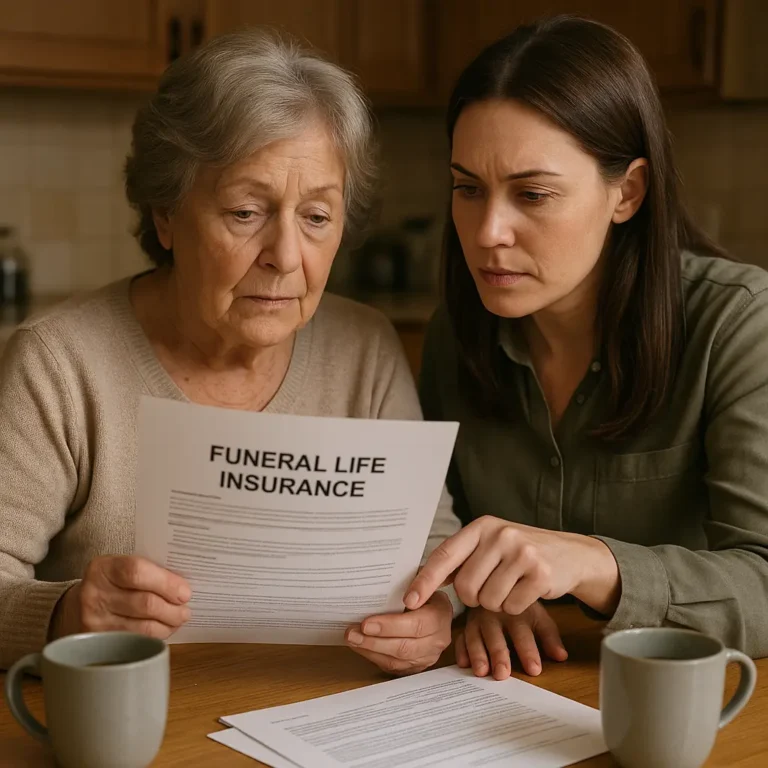Home > Final Expense > Final Expense vs Debt

Final Expense Insurance vs. Leaving Debt Behind — Protect Your Family from the Burden
When someone passes away without a plan, the bills don’t simply vanish — they fall into the laps of grieving family members. 💔 Final expense insurance is designed to prevent that. It covers funeral costs, burial or cremation, and even small debts so your loved ones aren’t left scrambling.
Without it, families often have no choice but to dip into savings, take out high-interest loans, or even turn to public fundraising just to pay for a funeral.
The choice is simple: ✅ plan ahead and protect your family — or risk leaving them with a financial burden at the worst possible time.
Why Final Expense Insurance Is More Than Just Funeral Coverage
Final expense insurance is often misunderstood as just enough for a casket or cremation. In reality, it’s much more. Think of it like an ice pack after an injury 🧊 — it doesn’t only numb one spot, it cools and reduces swelling wherever it touches. In the same way, these policies help your loved ones handle all the costs that show up when someone passes away, not just the funeral bill.
✅ Beyond the Casket — What Burial Life Insurance Really Covers
💬 Richard’s Story (Regretful)
“I went with the cheapest option — and it almost cost my family everything. That barebones policy wouldn’t have even covered half my funeral. I cancelled it and bought real final expense coverage. It costs a little more, but it’s enough to make sure my sister isn’t paying for my choices.”
Burial life insurance is broader than most people realize. The death benefit goes directly to your beneficiary, who can use it for:
- Funeral home and cemetery bills 🪦
- Outstanding medical bills 💊
- Credit card balances or personal loans 💳
- Even a mortgage or rent payment due that month 🏠
📊 With the average funeral running $7,000–$12,000 — and many seniors carrying $6,000 or more in other debts — a strong policy prevents your family from inheriting a financial headache during their time of grief.
💰 How Final Expense Insurance Pays Off More Than Just Funeral Costs
Unlike other insurance, there are no spending restrictions. Your beneficiary decides how to use the money.
That flexibility means they can:
- Pay funeral and burial arrangements first
- Clear the last month’s rent or utilities
- Wipe out personal loans or credit cards
- Cover travel costs for family attending services
- Put food on the table while taking time off work 🍲
➡️ In short, it creates a financial cushion that protects loved ones from the domino effect of bills that follow a death.
🚫 What Happens Without Coverage vs. With Coverage
Without coverage, families often face an immediate cash crisis:
- Funeral homes want payment upfront or within 30 days
- Relatives max out credit cards at 20%+ interest
- Savings accounts get drained 🚨
- Some families resort to GoFundMe campaigns that may not even reach their goal
✅ With coverage:
Loved ones can focus on honoring your memory, not worrying about money
Beneficiaries receive a tax-free check within days or weeks
No scramble for funds, no awkward fundraising appeals
The Real Cost of Dying Without a Plan in Place
It’s easy to put off planning for final expenses. But the truth is, when there’s no coverage in place, families get hit with bills they never expected. Think of it like a “pop quiz” you didn’t study for — except the test comes during the hardest moment of your loved ones’ lives. Let’s look at what really happens when there’s no plan.
📊 The Pop Quiz Nobody Wants to Fail
Here’s the quiz question most families miss:
💭 “How much cash can you access within 72 hours of a loved one’s passing?”
Most people assume the money will be there, but reality looks different:
Oops vs. Outcome Table
| What They Thought | What Actually Happened |
|---|---|
| “My kids will figure it out” | Kids argued over who pays what, ended up splitting $9,000 on credit cards 💳 |
| “I have $2,000 in savings” | Funeral cost $8,500 — family had to borrow the remaining $6,500 🏦 |
| “The government will help” | Social Security death benefit was only $255 ⚠️ |
| “My work insurance will cover it” | Coverage ended at retirement — no payout available ❌ |
| “Cremation is cheap” | Even cremation averaged $3,500 plus memorial service costs 🪦 |
Funeral homes usually want payment upfront or within 30 days. Bank accounts can be frozen during probate, and employer coverage often ends at retirement. That’s why families end up scrambling, right when they’re already heartbroken.
💔 Real-World Scenarios Where Families Take on Debt
Sadly, these aren’t rare — they’re everyday stories:
- A daughter in Ohio put her mother’s $7,200 funeral on three different credit cards at 20% interest.
- A son in Florida borrowed from his 401(k) to pay for his father’s burial, losing both the $10,000 principal and the retirement growth.
- A family in Texas held a car wash fundraiser but still came up $3,000 short for their grandmother’s service.
Without insurance, families often trade financial security for closure — and pay for it for years.
🏦 The Hidden Financial Dominoes That Fall
The funeral bill is just the start. After a death, families often face:
- Final medical bills (average $5,000, sometimes much more) 💊
- Credit card balances that don’t disappear 📉
- Last month’s rent or mortgage still due 🏠
- Car payments, utilities, and even small debts like magazine subscriptions 📬
When you don’t have final expense coverage, those dominoes fall one after another, piling more stress on loved ones who should be focused on healing.
⚠️ Mid-Article CTA:
Funeral costs can drain a family’s emergency fund in days. A final expense policy helps protect it.
How Funeral, Burial, and Cremation Costs Can Strain Loved Ones
The price of saying goodbye is higher than many families realize. Funeral homes, cemeteries, and cremation providers all require money up front. When savings aren’t enough, the weight falls on children, spouses, or siblings already struggling with grief. Let’s look at what those costs really mean for families.
🪦 The True Price Tag of Saying Goodbye
Looking at funeral bills is like checking the rearview mirror while driving 🚗 — expenses seem far away until you realize they’re closer than they appear.
Here’s the reality:
- The average traditional burial in the U.S. is now about $9,420
- Add a cemetery plot (~$2,000)
- A headstone (~$2,000)
- Grave opening/closing fees (~$1,500)
Even a “basic” cremation often costs $2,500–$4,500, not including urns, memorials, or gatherings. Families are shocked when they see the full bill, especially if they haven’t priced services in years.
💰 Breaking Down the Bill — Line by Line
In places like Chicago’s 60619 ZIP or Myrtle Beach’s 29588, $10,000 in final expense coverage can cost as little as $58 per month — far less than leaving loved ones to shoulder these bills:
- Professional services fee: $2,300
- Embalming and body prep: $1,250
- Viewing & ceremony: $1,900
- Basic casket: $2,500
- Vault or grave liner: $1,495
- Transportation: $350
- Death certificates & permits: $400
- Flowers & programs: $500
➡️ Total before cemetery costs: $10,695
That’s before adding cemetery charges, which push costs even higher.
😰 The Emotional Weight of Financial Worry
Money stress doesn’t just affect wallets — it affects hearts 💔.
- Adult children feel guilty about choosing cheaper service options
- Siblings argue over who pays which portion
- Spouses face overwhelming choices while mourning
Some families delay funerals for weeks, waiting to gather funds — which can prolong grief and prevent closure. Financial strain often fractures families when they need unity most.
💬 Gloria’s Story
“I always kept a small savings account for ‘just in case,’ but one hospital stay wiped out half of it in a week. Suddenly, my funeral costs would’ve landed on my kids. I enrolled in a final expense plan and finally felt peace, knowing they’ll never face that bill.”
Medical Bills, Credit Cards, and Other Debts After Death
Funeral costs aren’t the only financial challenge families face. After a loved one passes, medical bills, credit cards, and other debts can quietly pile up. These expenses create what feels like a second wave of grief — only this time, it hits the wallet.
📋 The Scoreboard of Final Debts
Let’s keep score, because numbers tell the story:
Final Expense Scoreboard: What Families Inherit
Team “No Coverage”:
- Medical bills not covered by Medicare: –$5,000 to –$15,000
- Credit card balances: –$2,000 to –$6,000
- Personal loans: –$1,000 to –$5,000
- Final utilities and rent: –$500 to –$2,000
- Auto loan balance: –$3,000 to –$10,000
📉 Final Score: –$11,500 to –$38,000 in debt
Team “With Funeral Life Insurance”:
- Death benefit payout: +$10,000 to +$25,000
- All debts covered: $0 owed
- Remaining funds for family: +$2,000 to +$10,000
📈 Final Score: Family protected, legacy intact ✅
🏥 The Hidden Costs Families Face After a Loved One Passes
Most people don’t realize Medicare doesn’t cover everything. Gaps include:
- Hospital deductibles
- Skilled nursing copays
- Prescription costs
- Ambulance rides
The last months of life often bring the highest medical bills, sometimes arriving weeks or months later — when families least expect them. These surprise charges pile on top of funeral costs, creating a financial double hit.
💳 How Debts Transfer to Grieving Families
Legally, some debts don’t transfer — but in practice, families often get stuck with them anyway. Here’s how:
- Joint accounts → the surviving person becomes 100% responsible
- Cosigned loans → the cosigner takes over payments
- Community property states → spouses may inherit certain debts
- Moral pressure → children often pay anyway, to protect the family’s reputation or because collectors call during a vulnerable time
Even if the law doesn’t require payment, the emotional pressure often does. Families dig into savings, max out cards, or pull from retirement to settle debts that final expense insurance could have cleared instantly.
⚠️ Mid-Article CTA:
Leaving bills behind means your family’s grief will come with added stress. We’ll help you avoid that.
How Final Expense Insurance Pays Off Quickly for Families
When a loved one passes away, families need money fast. Funeral homes want payment right away, and bills don’t stop coming. Final expense insurance is built to provide immediate help — it pays out quickly, so your family doesn’t have to wait months for probate or sell belongings just to cover costs. Think of it like a game controller with a turbo button 🎮⚡ — it speeds things up right when you need it most.
⚡ Immediate Cash Payouts vs. Delayed Estate Settlements
💬 Janet’s Story (Chat-Style Exchange)
Nephew: “Aunt Janet, do you have anything set aside for a funeral?”
Me: “I have savings, but it’s not much. I realized my savings could be gone in a month if something happened. I got a $10,000 final expense plan so my family wouldn’t have to borrow or dip into their own pockets.”
Traditional estate funds often get locked up in probate court — sometimes for months or even years. By contrast, final expense insurance is simple: your beneficiary submits a death certificate and claim form, and the check usually arrives in 7–14 days. That quick access keeps families from falling into debt during the most painful moments.
📊 Policy Type Comparison — Which Pays Fastest?
Here’s a side-by-side look at how final expense insurance stacks up against having no coverage:
| Feature | With Final Expense Coverage | Without Final Expense Coverage |
|---|---|---|
| No waiting period option | ✅ Yes (Level benefit plans) | ❌ N/A – no coverage |
| Terminal illness payout | ✅ Often available | ❌ None |
| Avoids probate | ✅ Always | ❌ Estate stuck in court |
| Funeral home accepts assignment | ✅ Direct payment possible | ❌ Family pays upfront |
| Time to receive funds | 7–14 days | 6–12 months (probate delays) |
| Guaranteed amount | ✅ Full death benefit | ❌ Depends on estate value |
🎯 Why Speed Matters During Loss
The speed of payout isn’t just convenient — it’s critical.
- Funeral homes may give discounts for prompt payment but add fees if families are late
- Credit card balances rack up interest immediately 💳
- Landlords and utility companies still want their money on time
Getting money fast lets your family make choices based on love and dignity, not desperation. It means paying for the service you want, not just what you can scrape together at the last minute.
Comparing Policy Costs to the Burden of Unpaid Debt
Some people hesitate to buy final expense insurance because they think it costs too much. But in reality, the monthly premium is often less than the interest families pay when they finance a funeral. Waiting or skipping coverage can cost far more in the long run.
💡 The One Thing You Didn’t Know About Final Expense Costs
Here’s the surprising truth:
- A $10,000 policy for a 65-year-old non-smoker might cost around $55/month
- The same $10,000 funeral put on credit cards at 18% interest racks up about $150/month in interest alone
- Insurance premiums stay the same for life, while debt interest keeps piling up
It’s like paying a little now to save a lot later. ✅ The math shows clearly that protecting your family with a small monthly premium is always cheaper than leaving them with thousands in bills plus interest.
📍 Coverage Costs Across America
Final expense insurance is surprisingly consistent across ZIP codes, whether you’re in Dallas 75217 or Philadelphia 19120. On average:
- A 60-year-old woman → $42/month for $10,000 coverage
- A 70-year-old man → $89/month for the same amount
- A 75-year-old couple → $165/month combined for $20,000 total
These premiums are steady and never increase with age or health changes once your policy is locked in. Compare that with families who:
- Take personal loans at 10–15% interest
- Cash out retirement funds (with tax penalties)
- Carry credit card debt for years after the funeral
Coverage provides predictability, while debt creates uncertainty.
🔄 The True Cost Comparison That Matters
Let’s break it down:
Without coverage:
- Funeral: $10,000
- Credit card fees & interest: +$4,000
- Total: $14,000 out of pocket
With coverage:
- Premiums: ~$60/month x 10 years = $7,200
- Tax-free payout: $10,000 benefit to family
- Net result: Family protected, no debt left behind
Even if you don’t pay premiums for decades, your family still receives the full benefit from day one. That’s what makes it one of the simplest and most effective ways to protect loved ones.
⚠️ Mid-Article CTA:
Even small debts can add up when paired with funeral costs. Let’s make sure they’re covered.
Why Seniors Choose Coverage to Spare Loved Ones Financial Stress
When seniors think about the end of life, the goal isn’t just to cover bills — it’s to protect family peace. Final expense insurance does more than provide money; it shields loved ones from stress, arguments, and guilt. It’s like Velcro 🧩 — it holds families together when life tries to pull them apart.
❤️ The Emotional Impact of Financial Preparedness
When seniors get coverage, they aren’t buying “just another policy.” They’re buying peace of mind. Knowing your children won’t have to borrow money or swipe credit cards for a funeral creates a sense of relief. Many policyholders say they sleep better and feel lighter because the weight of “what if” is finally lifted.
Final expense coverage often gives more emotional comfort than financial value — because peace of mind is priceless.
👨👩👧👦 Real Reasons Seniors Give for Getting Covered
Seniors share their personal motivations in simple but powerful words:
- “I saw my sister’s kids fight over money after she died — I won’t let that happen to mine.”
- “My pension dies with me. This is the only thing I can leave my wife.”
- “I’ve been independent my whole life; I’m not starting to depend on others now.”
- “My kids already have college loans and mortgages. They don’t need my bills too.”
- “This is my final gift to them — a funeral without financial worry.”
These aren’t sales lines — they’re heartfelt promises parents make to their families.
🛡️ Protection Beyond the Dollar Amount
Coverage isn’t just about numbers. It provides:
- Family unity — avoiding fights over who pays what
- Savings protection — kids keep their money for their own families
- Spousal stability — no dipping into retirement funds
- Permission to grieve — loved ones focus on healing, not scrambling for cash
The most important outcome? Your final act is an act of love — not a financial burden.
💬 Frank’s Story
“I thought my family would just pull together. But when I asked my daughter, she admitted they’d have to put it all on credit cards. That didn’t sit right. I got a final expense plan that will pay my children directly. I beat cancer once — now I’m making sure I beat debt too.”
Stories of Families Helped — and Hurt — by End-of-Life Planning
Many people think they’re ready for final expenses, but when the time comes, their plans fall short. Families often discover too late that savings, Social Security, or work benefits won’t stretch far enough. That’s why having real coverage makes the difference between peace of mind and financial chaos.
⚠️ The False Sense of Security That Catches Families Off Guard
Here’s what happens when families assume “it’s taken care of”:
- “Dad has $3,000 in the bank.” → Funeral costs $9,000, leaving kids with a $6,000 gap.
- “Mom still has work insurance.” → It ended when she retired.
- “Medicare covers this, right?” → No — Medicare only pays a $255 death benefit.
This false confidence shatters quickly, leaving loved ones unprepared and overwhelmed.
📋 What Families Actually Face — A Reality Checklist
Funeral Costs Checklist Table
| Expense Item | Average Cost | Covered by Savings? | Covered by Final Expense? |
|---|---|---|---|
| Basic funeral service | $2,300 | ❌ Rarely | ✅ Yes |
| Casket | $2,500 | ❌ Rarely | ✅ Yes |
| Embalming/Preparation | $1,250 | ❌ No | ✅ Yes |
| Burial plot | $2,000 | ❌ No | ✅ Yes |
| Headstone | $2,000 | ❌ No | ✅ Yes |
| Cremation (if chosen) | $3,500 | ❌ Partially | ✅ Yes |
| Outstanding medical bills | $5,000+ | ❌ No | ✅ Yes |
| Credit card debts | Variable | ❌ No | ✅ Yes |
| Final month’s expenses | $1,500 | ❌ Maybe | ✅ Yes |
➡️ Total Potential Costs: $15,000–20,000
Without coverage: ❌ Families left scrambling
With coverage: ✅ All handled with dignity
🙏 Avoiding Fundraisers and Family Appeals
Without a policy, families often turn to GoFundMe campaigns or car washes. But:
- Success isn’t guaranteed (many raise less than half their goal)
- Money takes time to process, while funeral homes want payment upfront
- Families are forced to market their grief publicly just to get help
Final expense insurance keeps things private and dignified. Loved ones don’t need to beg or borrow — the money is there when they need it.
⚠️ Mid-Article CTA:
A modest policy can spare your loved ones from taking on loans or credit card debt during a hard time.
How Much Coverage It Takes to Erase Funeral and Debt Worries
Final expense insurance isn’t one-size-fits-all. The right amount depends on your debts, funeral choices, and whether you want to leave something extra behind. Choosing wisely means your family won’t be left struggling. It’s like picking the right snorkel mask 🤿 — if it doesn’t fit, you’ll struggle to breathe when you need it most.
🎯 Choosing the Right Policy Size to Fully Eliminate Final Debts
💬 George’s Story (Skeptical → Confident)
What I Thought: “My work life insurance will cover me forever.”
What I Learned: “It ended the day I retired.”
What I Did: “I bought my own final expense policy so my wife wouldn’t be stuck with bills. Work benefits are nice, but they don’t always last. I wanted something guaranteed.”
Most seniors find that $10,000–$15,000 in coverage is enough to handle funeral expenses and lingering debts. Some go higher — $20,000 or more — if they want to leave extra for grandkids or a favorite charity. The key is adding up your costs, not guessing.
📊 Coverage Calculator — What You Really Need
Here’s a simple way to figure out the right coverage for your family:
- Basic funeral or cremation: $7,000–$12,000
- Medical bills (Medicare gaps): $2,000–$5,000
- Credit cards: Add your current balances 💳
- Personal loans: Add any remaining balances 🏦
- Household expenses: $1,000–$2,000
- Inflation buffer: 3–5% per year until likely need
📍 Example: If you expect a $9,000 funeral, have $3,000 in credit card debt, and want to cover medical bills too → $15,000 policy provides enough cushion with room for inflation.
💰 Why Most Seniors Choose $10,000 to $15,000 Policies
This sweet spot balances affordability and protection:
- Premiums typically run $40–$80 per month for healthy seniors
- It prevents financial crisis without “overbuying” coverage
- Keeps families from taking on loans or maxing credit cards
- Provides dignity in death without unnecessary expense
The bottom line: the right coverage amount ensures your final act is protection, not a financial burden.
Taking the First Step to Protect Your Family Today
Buying final expense insurance isn’t complicated — but waiting can cost you big. Many seniors think they’ll “do it later,” but every year that passes raises premiums. Acting now locks in lower rates and guarantees your family won’t face a last-minute scramble.
🔢 The Broken Calculator Method — Why Waiting Costs More
Here’s the tricky math most people get wrong. It’s like using a broken calculator 🧮 — the numbers don’t add up the way you think.
- At 65, a $10,000 policy might cost around $50/month
- Wait until 70, and the same coverage is closer to $75/month
- That’s $300 more per year, every year, for life
Over time, waiting just 5 years could mean spending thousands extra in lifetime premiums — money that could’ve stayed in your pocket. The earlier you buy, the more affordable it stays.
✅ Simple Steps to Get Started
Getting covered takes less time than most people think:
- Figure out how much coverage you need (usually $10,000–$15,000)
- Answer a few basic health questions (no medical exam required)
- Choose between level or graded benefit (based on health)
- Decide how to pay (monthly, quarterly, or yearly)
- Pick a beneficiary (anyone you choose)
- Sign the paperwork — most approvals happen in 24–48 hours
In less than 30 minutes, you can have peace of mind in place.
📞 What to Expect When You Apply
When you call, you’ll speak with a licensed specialist who understands seniors’ needs. They’ll ask about:
- Your current medications
- Any recent hospital visits
- General health conditions
But here’s the good news:
- ✅ No bloodwork
- ✅ No urine tests
- ✅ No doctor’s office visits
If you qualify for a level benefit plan, coverage starts right away. Even if health issues mean you need a graded or modified plan, there’s usually still an option to protect your family. The most important thing is starting before health changes take choices off the table.
❓ Frequently Asked Questions About Final Expense Insurance
Here’s a quick guide to the most common questions seniors ask about burial and funeral coverage. These answers are kept simple, so you know exactly what to expect.
🏠 Final CTA Block
Your Plan Is Like a House — What’s Holding Up the Roof?
Your family’s financial security is like a home. Debt is the storm that can rip the roof off.
Without final expense insurance:
⛈ Funeral bills hit like heavy rain
⛈ Credit cards and loans leak into your family’s finances
⛈ Costs pile up until everything feels ready to collapse
With coverage:
✅ Strong support beams protect your loved ones
✅ No scramble for money
✅ One last act of love, not a burden
💬 Closer: “You’ve spent a lifetime providing for your family. Don’t let the final chapter undo that. Let’s put a plan in place so your loved ones can say goodbye without worrying how to pay for it.”
Get My Free Quote →📚 Suggested Reading

About the Author
Dvir Mosche is an award-winning independent insurance agent and the founder of Palmetto Mutual, a trusted insurance brokerage specializing in Medicare, final expense, and senior benefits in North and South Carolina and across the country. Since entering the industry in 2017, he has been recognized multiple times as a top agent for his dedication to educating and assisting seniors in finding the proper coverage. His mission is to simplify the process, provide honest and personalized guidance, and ensure that every client gets coverage they can depend on for life.



